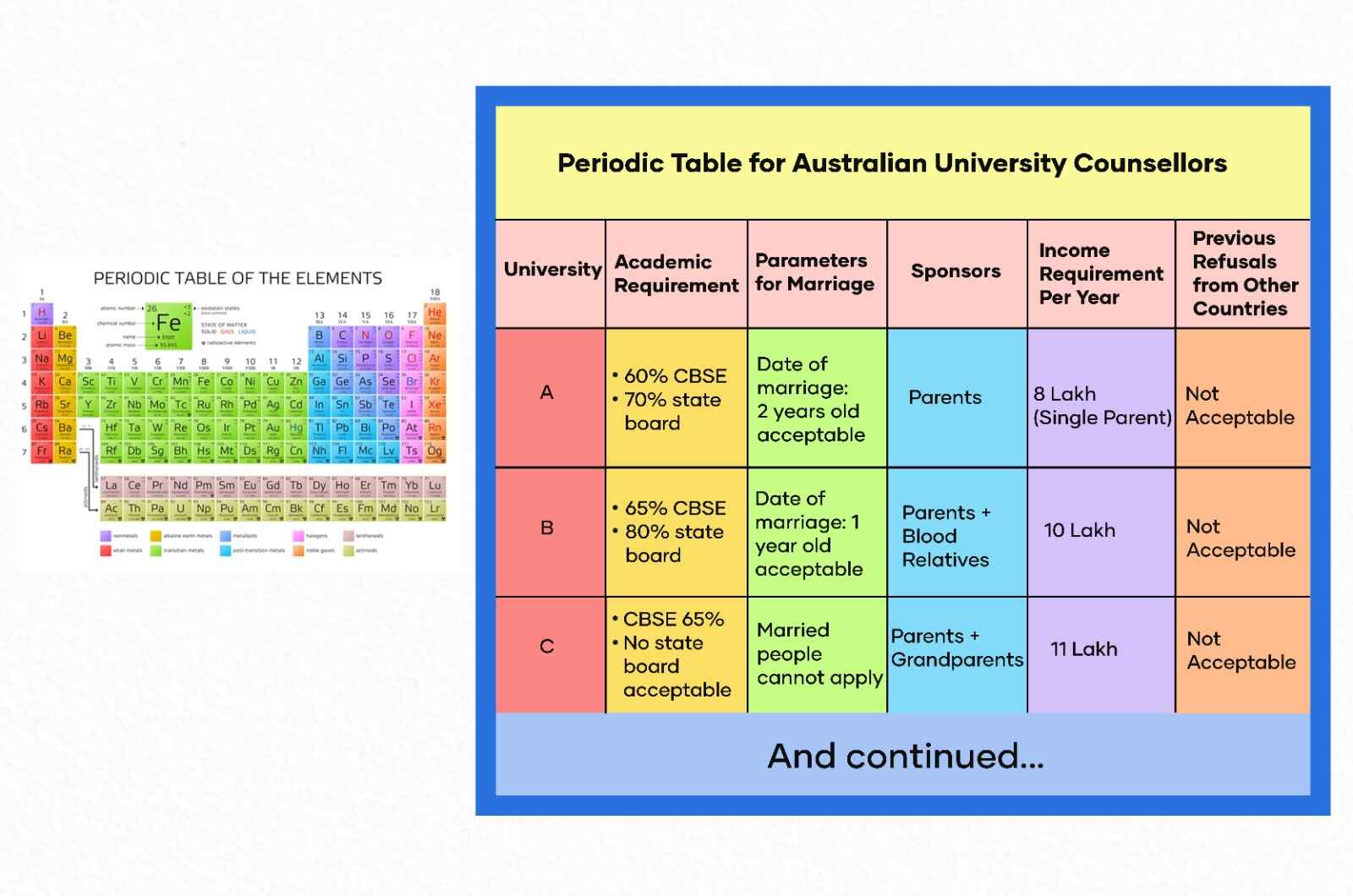Universities worldwide actively seek dedicated and talented international students, fostering a vibrant and diverse learning environment. Even international students desire that their classmates be serious and worthy. A university’s overall results and reputation are also affected by the kind of students coming in. These are primary basic requirements and are well understood.
However, admission requirements from institutions in Australia are like a ‘periodic table’ of elements where every requirement is different for every institution. Just like every element in the periodic table has distinct characteristics, the same is the case with these requirements, raising concerns, particularly those that are beyond the direct control of students.
The Flawed Logic of Selective Criteria
Excluding students based on the educational board they have attended, completely disregards the fact that education systems differ from one country to another. A student from a non-preferred board may have exceptional academic potential and talent. However, they are unfairly denied the chance to shine due to arbitrary criteria.
For example, some universities do not accept applications from state board students. Labelling all the students from a particular board as unqualified and denying them access, if a handful of students have faltered, is not justifiable. The same goes when universities do not accept agricultural or dairy income sources. One of the universities in Australia only accepts 30% of the agricultural income. Because a large number of international students hail from Punjab and Haryana, which are agriculture-dominant societies, this approach completely restricts this sector.
Does it mean that agriculture is not a valid or respectable profession? If we are not exaggerating, every other profession in the world depends on the agriculture industry, for if our stomachs are empty we cannot do anything. We need to come up with a credible reason to support this limitation. In other words, students hailing from agricultural families will not be able to study overseas, or not at all in these institutions. You can fulfil your study abroad dreams by talking to immigration consultants in Chandigarh.
Diversity in Requirements Leading to Confusion
Another requirement that catches the attention is the marital status of the applicant. Some institutions ask for marriage to be a minimum of two years old and registered before they can apply. While others do not accept applications from people with married status. There is little logic that can connect the duration of marriage and granting a student visa.
The source of income for married applicants is also checked, with some mandating that only 30% of funds can be from in-laws. The variety of requirements from institutions in Australia for international students is also seen in the annual income. While some say that eight lakhs for single-parent income is good enough, others ask for at least 12 lakh annual income.
Such a variety of demands is only leaving prospective international students in a state of confusion. Australia should be considerate enough to iron out all these diversities and provide a level playing field for them. Aspiring students already have to work on several things and by putting in such diversity they are losing their appeal to other countries. There needs to a uniformity or consensus among universities on admission requirements for international students.
Requirements Beyond The Control of Students
Scoring high grades, engaging in extracurricular activities, and staying in the good books of teachers and staff are within the control of students. However, there are multiple requirements other than those discussed above that are beyond control and are devoid of logic. One such is gap restrictions, which restrict even genuine students from starting their education after a gap. Other universities have nationality quotas.
Most of the students who are fresh out of school are often confused about which career stream to choose. Plus, they also juggle between different competitive exams giving a shot to get a hand on government jobs. Pursuing international education is one of the options considered, however, by the time they apply for a study visa, they already have an education gap.
If we look at such situations, these are not gaps, for the students are searching and studying to pick a career path. Universities abroad should not be too rigid when they consider the education gap. Even those who framed these rules or assessed visa files must have had their periods of career indecision. So, in place taking note of the gap period, they should consider why the gap was there.
Recognising Potential to Enroll International Students
Universities need to consider each application as a standalone. Tagging the entire sector based on what may have happened in the past is an escape from duty and making life easy for oneself. A well-rounded application should consider factors like extracurricular activities, and a student’s ability to demonstrate passion in a chosen field. Such adjustments will also help immigration consultants fulfil the allocated annual target, as the procurement area will widen.
Unreasonable restrictions have a significant impact on the future of aspiring international students. The future career prospects of talented individuals are limited as they are denied access to good universities. It is worth noting that such practices only contribute to widening the existing social inequalities by excluding students from certain backgrounds. Plan and prepare to study in Australia steering through the restrictions, and talk to overseas education consultants in Chandigarh.
Institutions in Australia have the most diverse admission requirements, many of which do not connect with the primary motive of education. It gives the feeling that each institution has its governance making things difficult for students. In place of creating a ‘periodic table’ of requirements, there should be a single window rollout for control and regulation.
A Global Stage for Talented Individuals
Universities are there not just to impart technical knowledge, but to create more equitable and socially responsible societies. However, some requirements are doing no one’s good. They should think beyond narrowing down admission criteria and making things easy for themselves. It is time to create an environment where academic merit and potential hold over arbitrary factors paving the way for a brighter future for international students.


